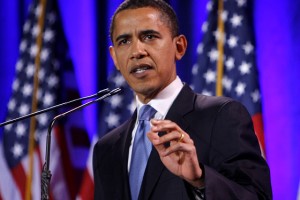 ทิศทางของสหรัฐอเมริกาภายใต้การนำโดย Barack Obama ในเรื่องของ Climate Change นั้น ส่อแววชัดเจนในการตัดสินใจที่จะใช้ระบบการประมูล (Auction System) กับทั้งหมด 100% ของคาร์บอนที่จัดสรรให้ผู้ได้รับสิทธิปล่อยออกมาได้ (Carbon Allowances) เพื่อเข้าเป็นรายได้ของประเทศในรูปของภาษี ทั้งนี้ตามคำอธิบายของ Obama เองก็เพื่อให้เกิดเป็นรูปธรรมในการกำหนดโครงสร้างของราคาคาร์บอน แต่ผู้ประกอบการนี่สิ คงต้องเล่นบทหนักในเรื่องของการแบกรับต้นทุนในยุควิกฤตเศรษฐกิจที่ตกต่ำอย่างทุกวันนี้ และนี่คือส่วนหนึ่งในการพูดคุยกันระหว่าง Obama และกลุ่ม Business Roundtable เมื่อวันที่ 12 มี.ค. ที่ผ่านมา ณ Washington D.C.
ทิศทางของสหรัฐอเมริกาภายใต้การนำโดย Barack Obama ในเรื่องของ Climate Change นั้น ส่อแววชัดเจนในการตัดสินใจที่จะใช้ระบบการประมูล (Auction System) กับทั้งหมด 100% ของคาร์บอนที่จัดสรรให้ผู้ได้รับสิทธิปล่อยออกมาได้ (Carbon Allowances) เพื่อเข้าเป็นรายได้ของประเทศในรูปของภาษี ทั้งนี้ตามคำอธิบายของ Obama เองก็เพื่อให้เกิดเป็นรูปธรรมในการกำหนดโครงสร้างของราคาคาร์บอน แต่ผู้ประกอบการนี่สิ คงต้องเล่นบทหนักในเรื่องของการแบกรับต้นทุนในยุควิกฤตเศรษฐกิจที่ตกต่ำอย่างทุกวันนี้ และนี่คือส่วนหนึ่งในการพูดคุยกันระหว่าง Obama และกลุ่ม Business Roundtable เมื่อวันที่ 12 มี.ค. ที่ผ่านมา ณ Washington D.C.
“MR. FULTON: My company, Weyerhaeuser, is committed to addressing climate change, and we’ve adopted significant emission reduction goals, and we support legislation to establish a cap and trade approach to climate change. In your comments you’ve expressed support for a cap for — with a hundred percent auction of carbon allowances to generate revenue for the government. In your comments earlier today you also talked about an implementation time frame of 2012.
I just wanted to comment that a number of us in the business community are concerned that a hundred percent auction will effectively be a tax that would impose significant costs on energy-intensive industries such as some that we operate, and may impact existing industries’ ability to fund needed investments in new low-carbon technologies.
I just wondered if you could explain how the hundred percent auction approach would work in our highly challenged economy — because we’re all feeling a lot of pressure today on costs — and yet still preserve jobs for existing industries, and strengthen our existing manufacturing sector.
THE PRESIDENT: Well, let me start by saying this. I said during the campaign we were looking at a hundred percent auction. We are not going to be able to move this in an effective way without partnership with the business community. But we just — we can’t get it done. And for businesses like yours that are committed to the concept and the idea, we’re going to work to make sure that it works for you.
Now, the experience of a cap and trade system thus far is that if you’re giving away carbon permits for free, then basically you’re not really pricing the thing and it doesn’t work, or people can game the system in so many ways that it’s not creating the incentive structures that we’re looking for. The flip side is, you’re right, if it’s so onerous that people can’t meet it, then it defeats the purpose — and politically we can’t get it done anyway.
So we’re going to have to find a structure that arrives at that right balance. We want to create a price structure. Keep in mind that the reason that I’m interested in a cap and trade approach is precisely because I think the market makes decisions about these technologies better than we do. You know, for those who are concerned about some heavy-handed command and control regulations coming down the pike, cap and trade is designed to say, you know what, here’s a target, here’s a price, you guys go figure it out and if you can make money on it, all the better.
So that’s the — that’s our goal. That’s what we want. And how that pricing mechanism works most effectively to actually influence incentives, but also be sufficiently realistic that industries are thriving as opposed to groaning under the weight of it, I think is going to be the trick. I’m confident that we can do it. We’ve done it before.” (source:http://blogs.wsj.com/washwire/2009/03/12/obamas-remarks-to-the-business-roundtable/)
